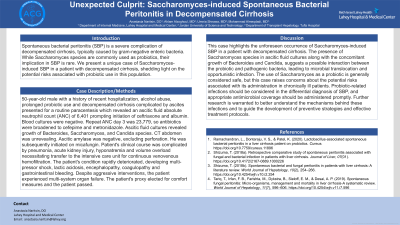Sunday Poster Session
Category: Liver
P1065 - Unexpected Culprit: Saccharomyces-induced Spontaneous Bacterial Peritonitis in Decompensated Cirrhosis
Sunday, October 22, 2023
3:30 PM - 7:00 PM PT
Location: Exhibit Hall

Has Audio

Anastasia Naritsin, DO
Lahey Hospital and Medical Center
Woburn, MA
Presenting Author(s)
Anastasia Naritsin, DO1, Ahlam Alzoghoul, MD2, Umnia Shnawa, MD2, Mohammad Almeqdadi, MD3
1Lahey Hospital and Medical Center, Burlington, MA; 2Jordan University of Science and Technology, Irbid, Irbid, Jordan; 3Lahey Hospital, Burlington, MA
Introduction: Spontaneous bacterial peritonitis (SBP) is a severe complication of decompensated cirrhosis, typically caused by gram-negative enteric bacteria. While Saccharomyces species are commonly used as probiotics, their implication in SBP is rare. We present a unique case of Saccharomyces-induced SBP in a patient with decompensated cirrhosis, shedding light on the potential risks associated with probiotic use in this population.
Case Description/Methods: 50-year-old male with a history of recent hospitalization, alcohol abuse, prolonged probiotic use and decompensated cirrhosis complicated by ascites presented for a routine paracentesis which revealed an ascitic fluid absolute neutrophil count (ANC) of 6,401 prompting initiation of ceftriaxone and albumin. Blood cultures were negative. Repeat ANC day 3 was 23,779, so antibiotics were broadened to cefepime and metronidazole. Ascitic fluid cultures revealed growth of Bacteroides, Saccharomyces, and Candida species. CT abdomen was unrevealing. Ascitic amylase was negative, excluding perforation. He was subsequently initiated on micafungin. Patient's clinical course was complicated by pneumonia, acute kidney injury, hyponatremia and volume overload necessitating transfer to the intensive care unit for continuous venovenous hemofiltration. The patient's condition rapidly deteriorated, developing multi-pressor shock, lactic acidosis, encephalopathy, coagulopathy and gastrointestinal bleeding. Despite aggressive interventions, the patient experienced multi-system organ failure. The patient's proxy elected for comfort measures and the patient passed.
Discussion: This case highlights the unforeseen occurrence of Saccharomyces-induced SBP in a patient with decompensated cirrhosis. The presence of Saccharomyces species in ascitic fluid cultures along with the concomitant growth of Bacteroides and Candida, suggests a possible interaction between the probiotic and pathogenic bacteria, leading to microbial translocation and opportunistic infection. The use of Saccharomyces as a probiotic is generally considered safe, but this case raises concerns about the potential risks associated with its administration in chronically ill patients. Probiotic-related infections should be considered in the differential diagnosis of SBP, and appropriate antimicrobial coverage should be administered promptly. Further research is warranted to better understand the mechanisms behind these infections and to guide the development of preventive strategies and effective treatment protocols.
Disclosures:
Anastasia Naritsin, DO1, Ahlam Alzoghoul, MD2, Umnia Shnawa, MD2, Mohammad Almeqdadi, MD3. P1065 - Unexpected Culprit: Saccharomyces-induced Spontaneous Bacterial Peritonitis in Decompensated Cirrhosis, ACG 2023 Annual Scientific Meeting Abstracts. Vancouver, BC, Canada: American College of Gastroenterology.
1Lahey Hospital and Medical Center, Burlington, MA; 2Jordan University of Science and Technology, Irbid, Irbid, Jordan; 3Lahey Hospital, Burlington, MA
Introduction: Spontaneous bacterial peritonitis (SBP) is a severe complication of decompensated cirrhosis, typically caused by gram-negative enteric bacteria. While Saccharomyces species are commonly used as probiotics, their implication in SBP is rare. We present a unique case of Saccharomyces-induced SBP in a patient with decompensated cirrhosis, shedding light on the potential risks associated with probiotic use in this population.
Case Description/Methods: 50-year-old male with a history of recent hospitalization, alcohol abuse, prolonged probiotic use and decompensated cirrhosis complicated by ascites presented for a routine paracentesis which revealed an ascitic fluid absolute neutrophil count (ANC) of 6,401 prompting initiation of ceftriaxone and albumin. Blood cultures were negative. Repeat ANC day 3 was 23,779, so antibiotics were broadened to cefepime and metronidazole. Ascitic fluid cultures revealed growth of Bacteroides, Saccharomyces, and Candida species. CT abdomen was unrevealing. Ascitic amylase was negative, excluding perforation. He was subsequently initiated on micafungin. Patient's clinical course was complicated by pneumonia, acute kidney injury, hyponatremia and volume overload necessitating transfer to the intensive care unit for continuous venovenous hemofiltration. The patient's condition rapidly deteriorated, developing multi-pressor shock, lactic acidosis, encephalopathy, coagulopathy and gastrointestinal bleeding. Despite aggressive interventions, the patient experienced multi-system organ failure. The patient's proxy elected for comfort measures and the patient passed.
Discussion: This case highlights the unforeseen occurrence of Saccharomyces-induced SBP in a patient with decompensated cirrhosis. The presence of Saccharomyces species in ascitic fluid cultures along with the concomitant growth of Bacteroides and Candida, suggests a possible interaction between the probiotic and pathogenic bacteria, leading to microbial translocation and opportunistic infection. The use of Saccharomyces as a probiotic is generally considered safe, but this case raises concerns about the potential risks associated with its administration in chronically ill patients. Probiotic-related infections should be considered in the differential diagnosis of SBP, and appropriate antimicrobial coverage should be administered promptly. Further research is warranted to better understand the mechanisms behind these infections and to guide the development of preventive strategies and effective treatment protocols.
Disclosures:
Anastasia Naritsin indicated no relevant financial relationships.
Ahlam Alzoghoul indicated no relevant financial relationships.
Umnia Shnawa indicated no relevant financial relationships.
Mohammad Almeqdadi indicated no relevant financial relationships.
Anastasia Naritsin, DO1, Ahlam Alzoghoul, MD2, Umnia Shnawa, MD2, Mohammad Almeqdadi, MD3. P1065 - Unexpected Culprit: Saccharomyces-induced Spontaneous Bacterial Peritonitis in Decompensated Cirrhosis, ACG 2023 Annual Scientific Meeting Abstracts. Vancouver, BC, Canada: American College of Gastroenterology.
